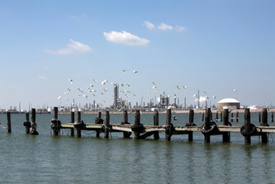05/06/2010 // West Palm Beach, FL, USA // Tara Monks // Tara Monks
New Orleans, LA – As struggles to contain the leak from a ruptured oil well in the Gulf of Mexico persist, federal officials and oil company BP are pumping chemical dispersants into the deepest parts of the Gulf, as reported by MSNBC.
As of Thursday, May 6, 2010, officials have sprayed 160,000 gallons of chemical dispersant on the surface of the Gulf, and an extra 6,000 gallons directly into the leak’s source.
While BP’s director of external affairs, John Curry reported that the company is encouraged with the results thus far; environmentalists are worried.
Dispersants are typically used in situations where the outcome looks negative in all approaches. Scientists have theorized that it is better to fill the ocean with low concentrations of dispersant chemicals, such as the ones being used now, than to allow for dense oil to remain on the water’s surface and wash ashore. It is a necessary evil in the eyes of many.
Another sight for leery eyes is the reluctance of the Nalco Company, the firm that produces the main dispersant officials are using, to reveal the complete composition of the product.
Corexit is one of approximately 20 different dispersant products on the market. Officials are wary of the long term effects the product may pose on marine environments. While Nalco Company claims the ingredients are unlisted for proprietary reasons, others claim that keeping the exact mix a secret makes evaluating potential risks and side effects difficult.
Corexit was barred from being used in British waters around 10 years ago after it failed to pass a shoreline safety test. According to a scientific adviser to the British government, Mark Kirby, the dispersant was found to be harmful to sea life that inhabited rocky shores. Kirby added that the product did pass British offshore safety tests, but regulations required products to pass both safety tests to be used in the country’s waters.
Dispersants do not remove the oil from the water. They merely force the substance to separate into tiny droplets that sink below the surface, which allows for them to flow with the currents away from the slick. While the chemicals within dispersants create a toxic product, it is hoped that the droplets become diluted within the open water. Thus, dispersants are most effect in treating spills in the deep ocean, where the current has the ability to disperse the oil droplets over a large, vast area.
An official of the international environment group Bellona, based in Oslo, told reporters, “We flew over there and saw BP spraying all over the place…We deserve to know what’s in there.”
Legal News Reporter: Tara Monks- Legal News for Environmental Lawyers.
Media Information:
Address:
Phone: 561-653-3266
Url: http://TaraMonks.visionsmartnews.com/gulf-coast-oil-slick-sprayed-with-dispersants_189.html







